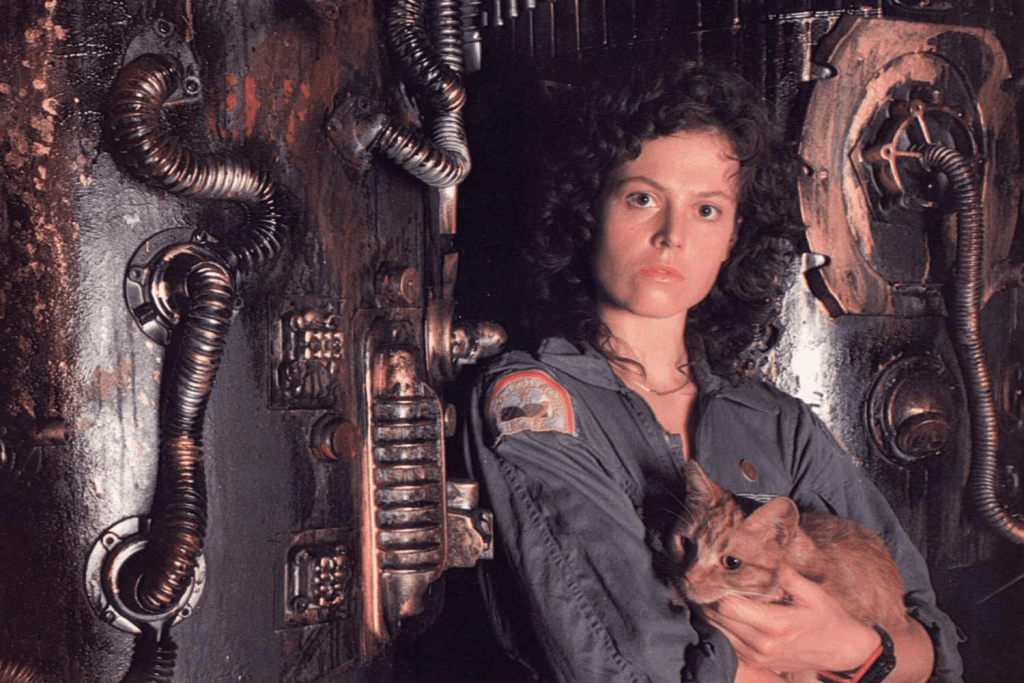
Sigourney Weaver’s portrayal of Ellen Ripley in Ridley Scott’s Alien (1979) revolutionized science fiction and horror. Few films in cinematic history have captured the imagination and fear of audiences as vividly as Alien. Sigourney Weaver, playing the determined and resourceful Ripley, brought an unparalleled authenticity and emotional depth to the role. Her performance not only elevated the movie’s storytelling but also cemented her status as a genre-defining actress.
The storyline, set aboard the Nostromo spaceship, depicts a crew’s battle for survival against a deadly extraterrestrial creature. While groundbreaking effects and haunting visuals contributed to Alien’s success, it was Weaver’s commanding performance that ensured the film’s enduring legacy. Her Ripley wasn’t just another action hero; she became an icon of courage, intellect, and human resilience.
Before Alien, Hollywood largely sidelined female protagonists in science fiction and action films, confining them to stereotypical roles. Weaver’s Ripley shattered those conventions with a blend of intelligence, vulnerability, and unrelenting determination. She wasn’t just another character; she was the driving force behind the film’s suspenseful narrative.
From the beginning, Ripley was portrayed as pragmatic, level-headed, and fearless in the face of insurmountable odds. Weaver’s nuanced acting balanced Ripley’s moments of quiet self-doubt with a fiery resolve, making her a relatable and inspirational figure. Her role continues to resonate because it redefined what a hero could look like—proving that strength and emotion aren’t mutually exclusive.
Ridley Scott envisioned Alien as a hybrid of sci-fi spectacle and horror’s visceral fear, creating an atmosphere of tension and unease. H.R. Giger’s alien design, with its biomechanical terror, became iconic, while the claustrophobic settings amplified the characters’ desperation.
However, Weaver’s contribution made Alien stand out. As Ripley, she brought a sense of relatability to an otherwise otherworldly plot. Her ability to think critically under pressure, coupled with her sheer willpower, ensured that the film became not just a creature feature, but also a psychological exploration of survival.

Casting Weaver as Ripley was a bold move, given her relative anonymity at the time. Yet, Ridley Scott saw something extraordinary in her. That decision paid off, as Weaver’s chemistry with the script and her commitment to authenticity helped create a timeless cinematic masterpiece.
The overwhelming success of Alien spawned a franchise that would span decades, with Sigourney Weaver reprising her role in three sequels: Aliens (1986), Alien 3 (1992), and Alien: Resurrection (1997). Each chapter added new dimensions to Ripley’s character, enabling Weaver to showcase her versatility as an actress.
In Aliens, directed by James Cameron, Ripley returned as a battle-hardened survivor, determined to protect others while confronting the demons of her past. This sequel highlighted Ripley’s maternal instincts, turning her relationship with Newt into a touching subplot. Weaver’s performance earned her an Academy Award nomination, a rarity for science fiction films.

The following sequels, Alien 3 and Alien: Resurrection, explored deeper themes of sacrifice, mortality, and humanity, providing Weaver with complex material to work with. Each iteration of Ripley further solidified her place in film history as a character who continually evolved while staying true to her essence.
Ellen Ripley became a cultural phenomenon, representing feminist empowerment in cinema. At a time when action films were dominated by male protagonists, Ripley proved that women could be just as commanding, intelligent, and heroic.
Weaver’s portrayal inspired countless strong female characters in the years to come, from Sarah Connor in The Terminator to Rey in Star Wars: The Force Awakens. Ripley’s story showed that strength isn’t solely defined by physicality; it’s also about mental resilience, emotional intelligence, and the willingness to confront fear head-on.

Ripley also changed how audiences perceived women in leadership roles. Her command of the Nostromo crew and her unwavering decision-making proved that women could lead effectively, even in life-or-death situations. This cultural shift paved the way for more inclusive storytelling in Hollywood.
While Ellen Ripley remains her most famous role, Sigourney Weaver’s career extends far beyond Alien. She has demonstrated incredible range across various genres, from her comedic turn in Ghostbusters to her dramatic performance in Gorillas in the Mist. Her ability to adapt to any role showcases her remarkable talent and dedication to her craft.
Weaver’s contributions to cinema have been recognized with numerous accolades, including multiple Golden Globe wins and Academy Award nominations. Her ability to seamlessly transition between blockbuster films and indie projects underscores her versatility as an actress.
More than four decades after its release, Alien and the character of Ellen Ripley remain deeply relevant. Ripley’s courage in the face of unimaginable terror speaks to the human condition—our instinct to survive, adapt, and overcome. Her journey from an ordinary crew member to an extraordinary hero mirrors the challenges many people face in their own lives, making her a relatable and timeless figure.

Weaver’s portrayal of Ripley also serves as a reminder of the importance of representation in media. Her groundbreaking role opened doors for more complex female characters, proving that diversity in storytelling not only reflects the real world but also enriches it.
Sigourney Weaver’s performance as Ellen Ripley in Alien isn’t just a standout in her illustrious career—it’s a defining moment in cinematic history. Ripley’s strength, intelligence, and humanity continue to inspire audiences and filmmakers alike. Weaver’s dedication to the role, combined with Ridley Scott’s visionary direction, ensured that Alien remains a benchmark for sci-fi and horror storytelling.
As we revisit the Alien franchise, it’s clear that Ellen Ripley’s legacy will endure for generations. Her story isn’t just about surviving against impossible odds—it’s about pushing boundaries, breaking stereotypes, and redefining what it means to be a hero.


